Vancouver, Washington Blood Testing Facilities
 Represents a LabCorp blood testing facility
Represents a LabCorp blood testing facility Represents a Quest Diagnostics blood testing facility
Represents a Quest Diagnostics blood testing facility

Nearby Labcorp Blood Testing facilities:
- Labcorp Center Distance: 8 m, 10373 Ne Hancock St Suite 122, Portland, Multnomah County, OR, 97220
- Labcorp Center Distance: 9 m, 9555 Sw Barnes Rd Suite 220, Portland, Washington County, OR, 97225
- Labcorp Center Distance: 15 m, 17050 Pilkington Rd Suite 220, Lake Oswego, Clackamas County, OR, 97035
- Labcorp Center Distance: 95 m, 5130 Corporate Center Ct Se, Lacey, Thurston County, WA, 98503
- Labcorp Center Distance: 99 m, 404 Black Hills Lane Suite A, Olympia, Thurston County, WA, 98502
Nearby Quest Blood Testing facilities:
- Quest Center Distance: 4 m, 8614 E Mill Plain Boulevard, Vancouver, Clark County, WA, 98664-2058
- Quest Center Distance: 7 m, 2351 Nw Westover Rd, Portland, Multnomah County, OR, 97210-3779
- Quest Center Distance: 99 m, 315 Cooper Point Rd Nw, Olympia, Thurston County, WA, 98502-4446
Washington Hormone Replacement Therapy Solutions
When we are young, we have a tendency to take our health for granted. As we grow older, we become more concerned with our health and wellness as we recognize the impact of both aging and conditions associated with aging. Many of the worst issues related to aging, such as weight gain, loss of energy, and sexual dysfunction, are not necessarily caused by aging, itself, but because of changes in hormone balance that occur as we grow older.
There are a number of reasons why our hormones decline, some are because of diet and lifestyle choices that we make, and others are genetic. The Conscious Evolution Institute is a fully licensed medical clinic that specializes in Hormone Treatments for men and women over the age of thirty, designed to help restore hormone balance and mitigate the effects of premature aging and persistent conditions associated with aging.
Washington HGH Therapy
One of the most requested treatments that we provide is Bio-Identical Human Growth Hormone Replacement Therapy. HGH is an important hormone. When we are young, it controls our growth and development, and after puberty, it sustains optimal cellular metabolism, preserving the balance of the body's many processes.
Human Growth Hormone Decline is a condition we will all face at some point in our lives, and it affects everyone different. Some people are very sensitive to this decline, and they end up with a condition known as Adult-Onset HGH Deficiency. This condition is associated with a variety of health issues which are commonly confused for aging, including unexplained weight gain, diminished memory and cognition, mood instability, and severe fatigue. Human Growth Hormone Injections can alleviate the symptoms of Growth Hormone Deficiency by directly supplementing the body's own supply of the hormone.
Washington Sermorelin Acetate HGH Alternative
Many patients also turn to a treatment known as Sermorelin Acetate in order to balance HGH production. Sermorelin is a functional analog of the hormone which stimulates the pituitary to release Growth Hormone, and is a safe alternative to Bio-Identical HGH which can restore youthful hormone balance with little to no risk of overdose.
Washington Low-T/Andropause Treatment
Advertisements on television emphasize the sexual effects of Testosterone Deficiency: Loss of Sex Drive and Erectile Dysfunction, but did you known that Testosterone Deficiency can have a dangerous impact on your health? Men with Low-T are more prone to obesity, heart attack, hypertension, and a number of other medical conditions which can significantly inhibit longevity.
Testosterone Replacement Therapy not only restores sexual function, it also safeguards the health, improves muscle mass, cuts fat, alleviates stress, and balances cholesterol, just to name a few benefits. The Conscious Evolution Institute offers a variety of options when it comes to Low-T Therapy, including Testosterone Sprays, Testosterone Creams, Testosterone Injections, and Testosterone Implants
Washington HCG Therapy
For men and women that are overweight or obese, the Conscious Evolution Institute also offers HCG Injections: a highly effective weight loss treatment that can help you shed 5+ pounds each week. HCG Injections stimulate metabolism, burn bodyfat, and suppress hunger, making it easier to diet without it feeling like a punishment.
Major Cities in Washington
Seattle
Seattle is the largest city and metropolitan area in the state of Washington, and is a valuable seaport for the United States. Seattle began as a logging town when it was first formed, but today, the city has a complex economy centered around sea and air transportation and trade. Also, the city is among those at the forefront for green technologies.
The most notable contribution that Seattle had to the national music scene was arguably Grunge music. Seattle was the home of a number of bands, including Nirvana, Alice in Chains, and Pearl Jam. Seattle is home to the MLB Seattle Mariners and Seattle Seahawks NFL Team.
Spokane
Spokane is the second largest city in Washington, and is located inland along the border between Washington and Idaho. Spokane is an important location for national trade and transportation, because it is the largest city between Seattle, Washington and Minneapolis, Minnesota.
The motto of Spokane is Near Nature, Near Perfect, because of the beautiful natural scenery of the surrounding area. Riverside State Park is located just a few miles away from the city limits of the city. Spokane, like Seattle, has a strong economy with a significant emphasis on high tech and green energy.
Tacoma
Tacoma is the third largest state in Oregon, located to the southeast of Seattle. Tacoma is located on Puget Sound, and is an inland port city. Tacoma is often referred to by the name The City of Destiny, because it was originally picked to be the western end-point of the Northern Pacific Railroad.
Tacoma is located adjacent to Commencement Bay, and for this reason, Tacoma has the largest port in the state of Washington. Tacoma has a large military presence, and is the location of the Joint Base Lewis-McChord, an important Army/Air Force Base.
Vancouver
Vancouver, Oregon (not to be confused with Vancouver, Canada) is a suburb of Portland, Oregon, and is the fourth largest city in the state. Vancouver is often referred to as Vancouver USA as a means to differentiate it from its larger international cousin. In recent years, it has started to be called Vansterdam because of its importance in the growing legal marijuana trade.
Because Vancouver is a suburb, most of its largest employers are in the field of health and education. The largest single employer is PeaceHealth Southwest Medical Center.
Bellevue
Bellevue is a suburb of Seattle, located directly across Lake Washington. Bellvue is the fifth largest city in the state of Washington. Translated into English, Bellevue means auBeautiful View. au Because of its location between Seattle and Redmond, the city is in a perfect advantage to take advantage of the best economic opportunities in the state of Washington.
Bellevue has an incredibly strong economy, and is often celebrated because of its resiliency in the face of the Great Recession. Bellevue is also one of the wealthiest cities in the state and the country, and is considered one of the best locations to live in the United States.
All About Vancouver, Washington Geographic Area
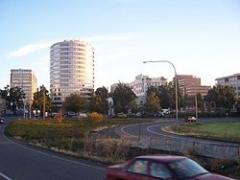

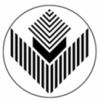
Vancouver is a city on the north bank of the Columbia River in the U.S. state of Washington. Incorporated in 1857, it is the fourth largest city in the state with a 2010 census population of 161,791 as of April 1, 2010 census. Vancouver is the county seat of Clark County and forms part of the Portland-Vancouver metropolitan area, the 23rd-largest metropolitan area in the United States.
Vancouver shares its name with the larger city of Vancouver located 305 miles (491 km) north in the Canadian province of British Columbia. Both cities were named in honor of sea captain George Vancouver, although the Canadian city was incorporated 29 years after the incorporation of Vancouver, Washington, and more than 60 years after the name Vancouver was first used in reference to the historic Fort Vancouver trading post on the Columbia River. City officials have periodically suggested changing the U.S. city's name to Fort Vancouver, Vancouver USA, or even Old Vancouver to reduce confusion with its northern neighbor. Many Pacific Northwest residents distinguish between the two cities by referring to the Canadian city as "Vancouver, B.C." and the United States one as "Vancouver, Washington," or "Vancouver USA." Local nicknames include: "Vantucky" and "The 'Couv(e)".
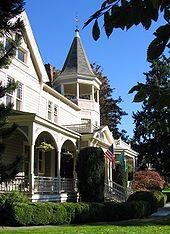
The Vancouver, Washington, area was inhabited by a variety of Native American tribes, most recently the Chinook and Klickitat nations, with permanent settlements of timber longhouses. The Chinookan and Klickitat names for the area were reportedly Skit-so-to-ho and Ala-si-kas, respectively, meaning "land of the mud-turtles." First European contact was in 1775, with approximately half of the indigenous population dead from small pox before the Lewis and Clark expedition camped in the area in 1806. Within another fifty years, other actions and diseases such as measles, malaria and influenza had reduced the Chinookan population from an estimated 80,000 "to a few dozen refugees, landless, slaveless and swindled out of a treaty."
Meriwether Lewis wrote that the Vancouver area was "the only desired situation for settlement west of the Rocky Mountains." The first permanent European settlement did not occur until 1824, when Fort Vancouver was established as a fur trading post of the Hudson's Bay Company. From that time on, the area was settled by both the US and Britain under a "joint occupation" agreement. Joint occupation led to the Oregon boundary dispute and ended on June 15, 1846, with the signing of the Oregon Treaty, which gave the United States full control of the area. Before 1845, American Henry Williamson laid out a large claim west of the Hudson's Bay Company (including part of the present-day Port of Vancouver), called Vancouver City and properly registered his claim at the U.S. courthouse in Oregon City, before leaving for California. The City of Vancouver was incorporated on January 23, 1857.
Based on an act in the 1859 ae60 legislature, Vancouver was briefly the capital of the Washington Territory, before being returned to Olympia, Washington by a 2 ae1 ruling of the territory's supreme court, in accordance with Isaac Stevens' preference and concern that proximity to Oregon might give its southern neighbor undue influence.
U.S. Army Captain (and future President) Ulysses S. Grant was quartermaster at what was then known as Columbia Barracks for 15 months beginning in September 1852. Soon after leaving Vancouver, he resigned from the army and did not serve again until the outbreak of the American Civil War. Other notable generals to have served in Vancouver include George B. McClellan, Philip Sheridan, Oliver O. Howard and 1953 Nobel Peace Prize recipient George Marshall.
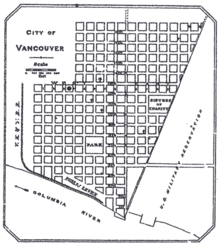
Army presence in Vancouver was very strong, as the Department of the Columbia built and moved to Vancouver Barracks, the military reservation for which stretched from the river to what is currently Fourth Plain Boulevard and was the largest Army base in the region until surpassed by Fort Lewis, 120 miles (190 km) to the north. Built on the old company gardens and skirmish range, Pearson Army Field (later Pearson Field) was a key facility, and at one point the US Army Signal Corps operated the largest spruce cut-up plant in the world to provide much-needed wood for airplanes. Vancouver became the end point for two ultra-long flights from Moscow, USSR over the North Pole. The first of these flights was performed by Valery Chkalov in 1937 on a Tupolev ANT-25RD airplane. Chkalov was originally scheduled to land at an airstrip in nearby Portland, Oregon, but redirected at the last minute to Vancouver's Pearson Airfield. Today there is a street named for him in Vancouver. In 1975 an obelisk was erected at Pearson Field commemorating this event.
Separated from Oregon until 1917, when the Interstate Bridge began to replace ferries, Vancouver had three shipyards just downstream which produced ships for World War I before World War II brought an enormous economic boom. An Alcoa aluminum plant opened on September 2, 1940, using inexpensive power from the nearby New Deal hydropower turbines at Bonneville Dam. After the bombing of Pearl Harbor, Henry Kaiser opened a shipyard next to the U.S. Army reserve, which by 1944 employed as many as 36,000 people in a twenty-four hours a day, seven days a week production of liberty ships, LST's, and "baby flat tops." This influx of shipyard workers boosted the population from 18,000 to over 80,000 in just a few months, leading to the creation of the Vancouver Housing Authority and six new residential developments: Fruit Valley, Fourth Plain Village, Bagley Downs, Ogden Meadows, Burton Homes and McLoughlin Heights. Each of these was later incorporated into the city, and are well-known neighborhoods, while the neighboring "shipyard city" of Vanport, Oregon, would be destroyed by the Memorial Day flood of 1948.
In 1956, Willie Nelson moved to Vancouver to begin his musical career, recording "Lumberjack." The single sold fairly well, but it did not establish his career. Nelson continued to work as a radio announcer in Vancouver and sing in clubs. He sold a song called "Family Bible" for $50; the song was a hit for Claude Gray in 1960, has been covered widely and is often considered a gospel music classic.
Vancouver has recently experienced conflicts with other Clark County communities because of rapid growth in the area. The city's first annexation more than doubled its size in 1909, with the largest annexation of 1997 adding 11,258 acres (45.56 km2) and 58,171 residents. As a result of urban growth and the 1997 annexation, Vancouver is often thought of as split between two areas, East and West Vancouver, divided by NE Andresen Road. West Vancouver is home to downtown Vancouver and some of the more historical parts of the city, as well as recent high-density mixed-use development.
More than one-third of the Vancouver urban area's population lives in unincorporated urban area north of the city limits, including the communities of Hazel Dell, Felida, Orchards and Salmon Creek. If county leaders had approved a major annexation plan in 2006, Vancouver would have passed Tacoma and Spokane to become the state's second-largest city.
Vancouver is located at 45 °38 a²1 a³ North, 122 °36 a²11 a³ West (45.633743, na122.603011) just north of the Columbia River, just west of where the Columbia River Gorge bisects the volcanic Cascade Range and just east of where the Willamette River enters the Columbia. The city of Vancouver is in the Western Lowlands region of Washington. When clouds do not blanket the Puget-Willamette trough formed by the Cascade and Coast Range, Mount Hood, Mount Saint Helens, Mount Jefferson and Mount Adams are all visible from Vancouver.
According to the United States Census Bureau, the city has a total area of 46.1 square miles (119 km2), of which 7.14% water.
Vancouver lies just north of Portland, Oregon and shares a similar climate. Both are classified as dry-summer subtropical (Csb) on the Koppen climate classification, with certain key exceptions. High pressures east of the Cascade Range create something of a venturi effect, leading to cold east winds down the Columbia River Gorge. Unsheltered by the Willamette Valley, Vancouver has historically seen colder temperatures, including "silver thaw" storms where freezing rain cakes limbs and power lines. Such storms can paralyze Vancouver. They frequently froze the river, and in 1916 cut electric power in the city for almost two weeks. Rainfall occurs frequently throughout the fall, winter, and spring, but ceases around the middle of June, with dry and warm weather lasting through September. Average annual precipitation is 42 inches (1,100 mm). Heavy snowfalls are infrequent and snow often falls and doesn't stick, with major snowstorms only occurring every 2 ae4 years. Close proximity to the river was also a concern for flooding, before dams constricted the river, destroying features such as Celilo Falls. Periodic floods have been a nuisance, with two of the most destructive in June 1894 and May, 1948. The 1948 Memorial Day flood almost topped the Interstate Bridge's support piers and completely destroyed nearby Vanport, Oregon. Other unusual storms include the Columbus Day windstorm of 1962 and an April 5, 1972 tornado which rated F3 on the Fujita scale, striking a local school. A F1 tornado struck on January 10, 2008 just after noon causing moderate damage along a 2-mile (3.2 km) path from Vancouver Lake to the unincorporated Hazel Dell area.
Because many Vancouver residents work in Portland, there is typically significant rush hour traffic congestion on two bridges that cross the Columbia River ae the Interstate Bridge and the Glenn Jackson Bridge. In 2006 there were 278,043 weekday vehicle crossings on the two bridges.
As of the census of 2000, there were 143,560 people, there were 56,628 households, and 36,298 families living in the city. The population density is 3,354.7 people per square mile (1,295.4/km ²). There were 60,039 housing units at an average density of 1,403.0 per square mile (541.7/km ²). According to the 2010 US Census, The racial makeup of the city was 76.2% White, 2.9% African American, 1.0% Native American, 5.0% Asian, 1.0% Pacific Islander, and 4.80% from two or more races. Hispanic or Latino of any race were 10.4% of the population.Page text. 16.4% were of German, 9.2% English, 8.4% Irish and 7.9% American ancestry according to Census 2000. 89.2% spoke English, 5.1% Spanish, 3.2% Russian, 1.4% Ukrainian and 1.1% Vietnamese as their first language. A large increase in persons with Russian or Ukrainian as their primary language has occurred.
There were 56,628 households out of which 33.4% had children under the age of 18 living with them, 47.3% were married couples living together, 12.1% had a female householder with no husband present, and 35.9% were non-families. 27.6% of all households were made up of individuals and 8.3% had someone living alone who was 65 years of age or older. The average household size was 2.50 and the average family size was 3.06.
In the city the population was spread out, with 26.7% under the age of 18, 9.8% from 18 to 24, 32.1% from 25 to 44, 20.6% from 45 to 64, and 10.7% who were 65 years of age or older. The median age was 33 years. For every 100 females there were 96.9 males. For every 100 females age 18 and over, there were 93.8 males.
The median income for a household in the city was $41,618, and the median income for a family was $47,696. Males had a median income of $37,306 versus $26,940 for females. The per capita income for the city was $20,192. 9.4% of families and 12.2% of the population were below the poverty line, including 16.1% of those under the age of 18 and 8.2% of those 65 and older.
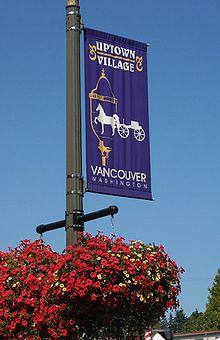
The Vancouver economy is characterized by border economics with neighboring Portland, Oregon. The state of Washington levies no individual or corporate income taxes and levies a property tax below the national average and a sales tax above the national median. The State of Oregon has no sales tax but one of the highest state income taxes. As a result, many Vancouver residents prefer to shop in neighboring Portland where they do not pay sales taxes then live and work in Vancouver where they do not pay state income tax. For the same reasons, the city is popular with retirees. Conversely, the city is less favored by students and young adults. In 2003, 70% of workers in Vancouver worked in Clark County. There is a risk in sales tax avoidance because Washington has a use tax due on all purchases made in Oregon that are then returned to Washington. Vancouver residents "shop at their own risk" when attempting to avoid the sales tax in Washington, although the rule is rarely, if ever, enforced (except for purchases requiring registration, such as motor vehicles).
The skewed taxation and demographics depresses the retail and entertainment sector of Vancouver's economy. Oregon has stricter development laws to protect the timber industry; therefore, Vancouver tends to attract a higher proportion of the region's sprawling development. Outer areas are dominated by strip malls and franchise stores. Downtown revitalization efforts have repeatedly underperformed. The skewed voting base also lead to rejection of extension of Portland's light-rail system into the city for several years. In 2015, Washington will transition away from being a control state, but Oregon will continue to maintain a monopoly on alcohol sales.
The economic history of Vancouver reflects the region. Moving from a salmon- and trade-based indigenous economy by the Chinook people, the Hudson's Bay Company pioneered extractive industries such as the fur trade and timber. Subsistence agricultural gave way to market and export crops such as apples, strawberries and prunes. Largely bypassed by the railroad in the 1880s, when the Oregon Steam Navigation company would ferry trains across the river downstream from St. Helens, Oregon to Kalama, Washington, early downtown development was focused around Washington Street (where ferries arrived), lumber and Vancouver Barracks activities such as a large spruce mill for manufacturing airplanes. A 1908 railroad swing bridge across the Columbia allowed greater industrial developments such as the Standifer Shipyard during the first world war. With the Interstate Bridge and Bonneville Dam Vancouver saw an industrial boom in the 1940s, including the Kaiser shipyard and Alcoa, as well as a Boise Cascade paper mill, just west of the Interstate Bridge.
As the old-growth forests were depleted and heavy industry left the United States, Vancouver's economy has largely changed to high tech and service industry jobs, with many residents commuting to Portland. Vancouver contains the corporate headquarters for Nautilus, Inc. and The Holland (parent company of the Burgerville, USA restaurant chain).
The Port of Vancouver USA operates a port on the Columbia River, which separates Oregon to the south and Washington to the north. It handles over 400 ocean-going vessels annually, as well as a number of barges which ply the river and its tributaries as far as Lewiston, Idaho.
According to the City's 2009 Comprehensive Annual Financial Report, the largest employers in the city are:
In 1997 the city of Vancouver decided to dedicate the next 15 ae20 years to redevelop and revitalize a huge portion of the downtown core. The first projects started in the early 2000s with the construction of many tall condominium structures around Esther Short park and in the Uptown Village neighborhood. The most lauded outside investment was the construction of a Hilton hotel directly across from the park. Currently the city is building a new shopping complex, including a recently finished Fred Meyer, just outside of the downtown core.
The Columbian newspaper finished building a new seven-story building adjacent to the Hilton in 2008 which due to financial strains in the company remained vacant and unused. Early in 2010, The Columbian filed for Chapter 11 bankruptcy and the building defaulted to Bank of America. In statement issued June 3, 2010 by City Manager Pat McDonnell, the City of Vancouver has reached a tentative agreement to purchase the former downtown Columbian office building for a fraction of the construction cost. Under the terms of the pending deal, the city will buy the two-year-old building and 5.14 acres (20,800 m2) for $18.5 million for use as a new city hall. Before giving up the building in bankruptcy, the owners of The Columbian office building had been asking $41.5 million. By making the move, the city will save $1 million annually it pays on leases to house about 300 employees in about five buildings around the city, McDonnell said in his announcement.
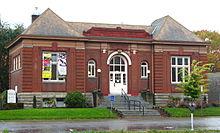
There are plans in the future for a new development along C Street in downtown that would include a new library (opened July 2011), a new Marriott hotel and roughly 250 new condominiums. Other planned projects include:
Vancouver has two school districts: Vancouver Public Schools and Evergreen School District.
The Vancouver Public Schools cover most of west Vancouver and has six high schools: Hudson's Bay High School, Columbia River High School, Fort Vancouver High School, Lewis and Clark High School, Skyview High School, and the Vancouver School of Arts and Academics (grades 6 ae12). It also has six middle schools: Alki Middle School, Discovery Middle School, Gaiser Middle School, Jason Lee Middle School, Thomas Jefferson Middle School, and McLoughlin Middle School.
Vancouver Public Schools' elementary schools include Sarah J. Anderson, Chinook, Eisenhower, Felida, Ben Franklin, Fruit Valley Community Learning Center, Harney, Hazel Dell, Hough, Martin Luther King, Lake Shore, Lincoln, Marshall, Minnehaha, Peter S. Ogden, Eleanor Roosevelt, Sacajawea, Salmon Creek, Truman, Walnut Grove, and Washington.
The Evergreen School District covers most of east Vancouver and has six high schools: Evergreen High School, Mountain View High School, Heritage High School, Union High School, Legacy High School, and the Clark County Skills Center.
The district also consists of six middle schools: Covington Middle School, Cascade Middle School, Frontier Middle School, Pacific Middle School, Wy'East Middle School, and Shahala Middle School.
Evergreen School District's elementary schools include Burton, Hearthwood, Ellsworth, Image, Orchards, Sunset, Silver Star, Sifton, Pioneer, Burnt Bridge Creek (BBC), York, Crestline, Riverview, Marrion, Fisher's Landing, Mill Plain, Columbia Valley, Harmony, Illahee, and Endeavour.
Vancouver is also home to the Washington School for the Deaf and Washington State School for the Blind, and Home Choice Academy, a school for home-schoolers.
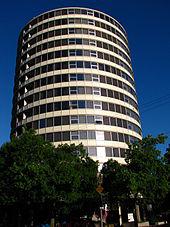
Mother Joseph was one of the first architects in the region, and because of its relatively long history, Vancouver contains a variety of buildings. Homes vary from Victorians and craftsman bungalows downtown, to small wartime tract housing and ranch-styles mid-town, with rural styles and larger homes in the outer ring. In addition to the reconstructed Fort Vancouver at the Fort Vancouver National Historic Site, the city was named one of the National Register of Historic Places' "Dozen Distinctive Destinations" for 2003.
Other notable buildings in Vancouver include:
Many of these buildings have been re-purposed. The 1867 Slocum House, an Italianate villa style residence originally built one block south of its current location in Esther Short Park. It was moved to its present location at Esther Short Park in 1966 and now houses a community theatre company. The Carnegie Library was expanded in the 1940s, becoming the Clark County Historical Museum after a new library was built in 1963. Other buildings have been torn down for urban renewal or renovated to house professional offices such as lawyers and accountants.
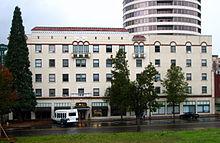
Vancouver has recently[when?] seen a revitalization of local art and cultural events. In 2010 there was a movement among local artists to form cooperatives and meet with established local gallery owners for a monthly forum known as "Art Conversations". Much of Vancouver's art scene is located in Downtown Vancouver.
The Kiggins Theatre located within the Downtown Vancouver Art District, was built in 1936 by architect Day Hillborn. It was named for J.P. Kiggins, an entrepreneur and politician who cut a swath through town in the early 20th century, serving as Vancouver's mayor for 15 non-consecutive years between 1908 and 1935.
Since the mid-1960s, Vancouver hosted a Fourth of July fireworks display on the grounds of Fort Vancouver National Historic Site that drew many people to the city. The display routinely ran to 45 minutes, attracted up to 60,000 visitors and was broadcast on area television, one of the largest west of the Mississippi River. Due to the death of key organizer "Mister Fireworks" Jim Larson and a poor economy, the show was not held in 2009. A shorter, redesigned 2010 show charged admission and brought in approximately 35,000 people.
Late August features the Vancouver Wine and Jazz Festival in Esther Short Park, the largest jazz festival in SW Washington.
Each September sees St. Joseph Catholic School host the Vancouver Sausage Fest, drawing attendance upwards of 100,000 over three days.
Vancouver is located within the Portland media market for print, radio, and television media. It does however serve as the hometown for some media.
Word Count: 4331





